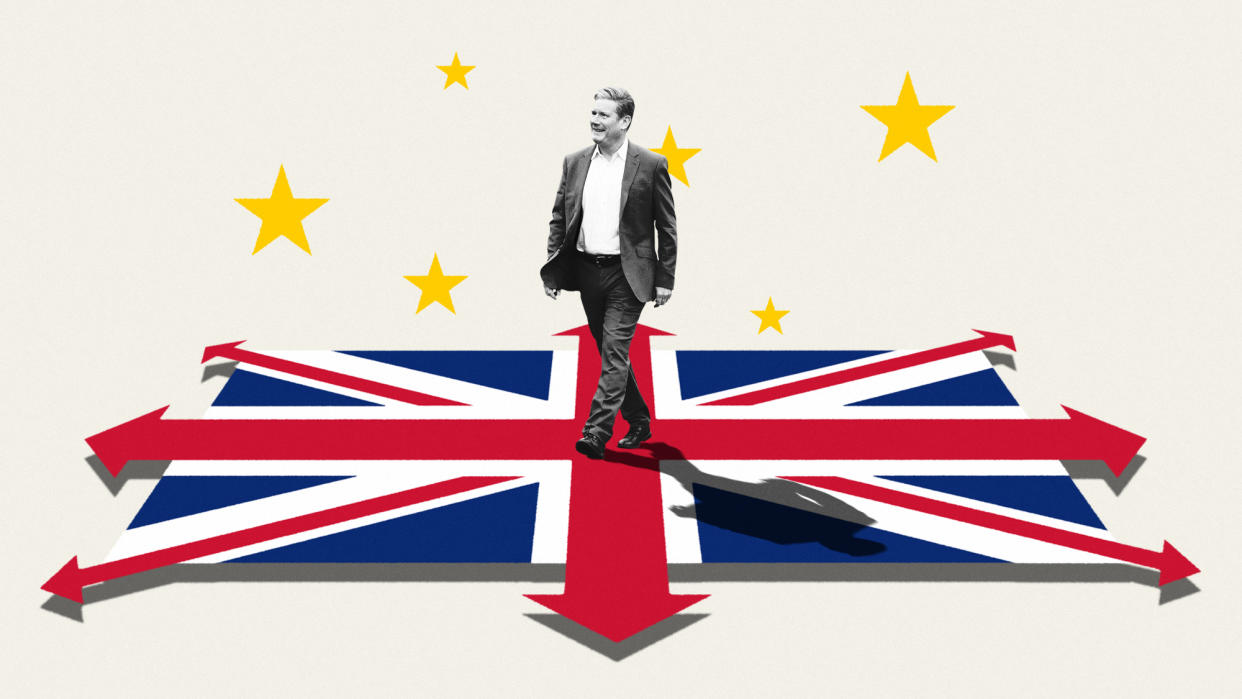Would Keir Starmer get a better Brexit deal?

Keir Starmer has been accused of a "Brexit betrayal" after promising to rewrite the UK's deal with Brussels.
Before holding talks with French president Emmanuel Macron, the Labour leader said he wanted to secure "much better" arrangements with the EU. This prompted accusations from one former Tory minister that he is "cosying up to the EU" and "unpicking Brexit", said the Daily Mail.
Starmer believes the existing deal is "far too thin" and thinks Brexit is "not the electorally toxic issue it was". Changing Boris Johnson's Brexit agreement could now be a "vote winner", said The Times.
But Brussels has "played down the prospect" of a significantly improved trade agreement with the UK, so there are question marks over how much change is even possible.
What did the papers say?
Senior figures in Brussels have warned that the forthcoming review of the Trade and Co-operation Agreement is more about "housekeeping" than changing the UK and EU’s relationship, said The Times. Any move to renegotiate the deal would not be easy as it would need the backing of both the European Commission and the 27 member states.
Starmer has ruled out rejoining the EU single market or customs union and therefore has a "Brexit delusion", wrote Wolfgang Münchau for The New Statesman. His claim that a better deal is achievable in such circumstances is a "political lie" that will "almost certainly be exposed as such", he added.
The two "big" issues – Northern Ireland, and Britain’s associate membership of the EU’s Horizon science programme – have been "resolved", added the director of Eurointelligence, so "if your bottom line is that you do not wish to rejoin the single market and the customs union", there "really is not a lot more out there".
Starmer's self-imposed "red lines" have "limited" how far the UK's trading relationship with EU can be improved, experts told the Financial Times. "In most European capitals Brexit is yesterday's problem," the paper said, after a senior EU official told it: "There's little appetite to reopen the Brexit psychodrama in Brussels."
Anxiety over the domestic fallout could also hamper Starmer, who "shudders with fear" at any accusation that he might favour returning to Europe's customs union or single market, said The Guardian's Simon Jenkins. The Labour leader "quails at the thought of what a Brexit voter in a 'red wall' seat might say", he wrote.
What next?
The meeting with Macron in Paris is less about direct negotiations and more the latest stop on Starmer's "grip-and grin world tour", said the BBC's political editor, Chris Mason. "I am told by Labour folk that it is a 'getting to know each other session' rather than much else," added Mason. Nevertheless, it is a milestone in Starmer's ambition to renegotiate the Brexit deal.
But given the difficulties and seemingly limited wriggle room, said the FT, the UK side will have to "think carefully about a quid pro quo to unlock more flexibility from the European Commission on trade issues". To charm Brussels, London could pay into EU programmes, like the Erasmus student exchange scheme, or offer easier work visas for Europe's young people and students, it suggested.
Other "potential areas for deeper co-operation" include "diplomacy and security", it continued. London and Brussels could also work on "deeper cyber security and intelligence co-operation", as well as more agreement on renewable energy and carbon-pricing systems.
Britain could also try to negotiate some "improvements for individual sectors of the economy", such as a veterinary agreement to reduce checks on animal and plant products, which would benefit food and drink exporters.
However, no one believes any of this will be straightforward. The UK in a Changing Europe research group said Starmer risks "demanding more than the EU is willing to give", said The Independent.
Some experts warn that Starmer's aspirations will "quickly get bogged down in negotiations in Brussels" and cause political problems for him at home. But Mujtaba Rahman, head of European analysis at the Eurasia Group think-tank, told the FT that if Starmer "delivers consistent British engagement with the EU", based "more on shared values and less on domestic politics", that will "create goodwill, which will then underpin the dynamic between the two sides across the board".

